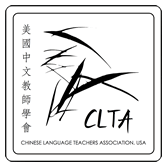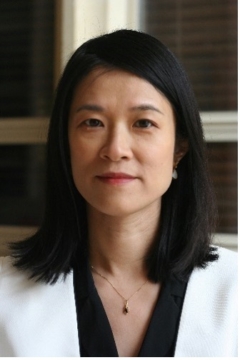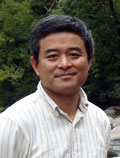The CLTA Board, at its meeting on 11/19/2015 at San Diego, decided to suspend the Walton Lifetime Achievement Award and the Walton Presentation Award.
Dr. A. Ronald Walton (1943-1996), a long-time member of CLTA, was an internationally-recognized expert in the areas of language pedagogy, policy and planning for the less commonly taught languages in general and Chinese in particular. Ron helped found the National Foreign Language Center (NFLC) in 1987, and served as its Deputy Director until his death. In that capacity, he served as either principal investigator or co-principal investigator for at least fifteen major grants shaping a new vision for language learning and teaching in America. Dr. Walton played a critical advisory role in the development of both the Generic and Chinese ACTFL Proficiency Guidelines, the Chinese Proficiency Test and Pre-Chinese Proficiency Test, and the NFLC Guide for Basic Chinese Language Programs. His 20 years of Chinese language teaching experience included prominent positions with the FALCON intensive language program at Cornell University, the University of Pennsylvania, and the University of Maryland.
While Ron was clearly one of the preeminent members of the Chinese language teaching profession at the college level, he was particularly willing to give his time, counsel and support to those just beginning their careers as Chinese language educators, as well as those teaching in settings other than the college level. It thus seems appropriate that the best way to honor Ron is through two annual awards that might serve both to recognize long-term contributions to the field of Chinese language pedagogy, and to provide financial support for those who might not otherwise be able to attend the CLTA annual meeting.
[ CLTA Walton Award – Walton Presentation Prize ]
Call for Nominations:
CLTA WALTON LIFETIME ACHIEVEMENT AWARD (Deadline: April 30, 2015)
The CLTA Walton Lifetime Achievement Award, founded in 1998 by friends and colleagues of Ronald Walton, and funded in 2005 by a perpetual endowment from the Cheng & Tsui Company in honor of Ronald Walton’s (1943-1996) lifetime dedication to Chinese language education and cross-cultural understanding, is given for overall contributions to the field of Chinese language pedagogy. All members in the community of Chinese language teaching and research, with the exception of current CLTA officers and members of the Board of Directors, are eligible for the award. The Walton Award consists of a plaque presented at the CLTA Annual Meeting.
To nominate a candidate for the Walton Award, please submit: 1) a letter of nomination (in either English or Chinese) describing the candidate’s scholarship, service, leadership, and innovative contributions in the field of Chinese language teaching, 2) a current Curriculum Vitae of the nominated candidate, and 3) two letters of support (in either English or Chinese) from other CLTA members addressing the candidate’s accomplishments in the categories mentioned in (1).
RECIPIENTS OF THE CLTA WALTON AWARD (1998 – )
| 1998: |
John DeFrancis, Emeritus Professor of Chinese at the University of Hawaii, was awarded (in absentia) the inaugural CLTA Walton Award for his outstanding contributions to the field of Chinese language pedagogy, on November 21, at the 1998 CLTA General Membership Meeting in Chicago, Illinois. John DeFrancis (1911-2009) Online Memorial. |
| 1999: |
Professor Shou-hsin Teng, Director of the Graduate Institute of Teaching Chinese as a Second Language, National Taiwan Normal University, and Editor of the Journal of the Chinese Language Teachers Association from 1995 to 2002. |
| 2000: |
Dr. Madeline Chu, Program Director and Chair of the Chinese Program at Kalamazoo College, and CLTA Executive Director from 1992 to 2000. |
| 2001: |
Dr. John Young, Honorary Member (CLTA Board of Directors), Seton Hall University, former Secretary-Treasurer of CLTA, and one of the founding members of CLTA. |
| 2002: |
Professor George Chao (University of Chicago), Professor Chauncey Chu (University of Florida), and Ms. Chih-Ping Chang Sobelman (Columbia University). Professors G. Chao and C. Chu are retiring at the end of the academic year, after many decades of teaching and contributions to the field.
In November 2002, our CLTA Walton Award recipients were each presented a plaque at the CLTA banquet, where they had been invited to be guests at the 2002 CLTA Banquet and Roundtable Discussion, celebrating CLTA’s 40th anniversary (that is, the end of 40 years since the establishment of the Association in 1962). A lively roundtable discussion, moderated by CLTA President, Prof. Claudia Ross, centered on the theme of “CLTA past, present and future.” |
| 2003: |
Professor Yuehua Liu (Harvard University) has been a long-time member of the Chinese language teaching profession. She is author of numerous articles and books, and is one of the prime movers in producing the successful Integrated Chinese series. |
| 2004: |
Professor Te-ming Yeh (National Taiwan Normal University) and John Montanaro (Far Eastern Publications), who have made outstanding contributions to the profession. |
| 2005: |
Professor Tsung Chin (University of Maryland) was recognized for his long-term dedication and contributions to both calligraphy education and Chinese language teaching. Over the past 20 years he has been a dedicated promoter of calligraphy education as an important component of the teaching of the Chinese language.
Professor Chin passed away at the age of 80 on 8 April 2006. To express the CLTA Board of Directors’ deepest condolences on the loss of our long-time colleague, an open letter written by Professor Jerome Packard on the Board’s behalf is published in the May 2006 issue of our Journal. |
| 2006: |
Professor Jing-heng Ma (Dept. of E. Asian Langs. and Lits., Wellesley College) was recognized for her myriad of contributions to the field of Chinese language pedagogy and linguistics. She has been a prolific contributor in all aspects of the field, teaching all levels of Chinese language, developing teaching materials (both texts and computer-assisted materials), researching in both pedagogy and linguistics and training teachers. |
| 2007: |
Professor Vivian Ling (Oberlin College), for her outstanding lifetime achievement in Chinese teaching. The Awards Committee recognizes Ling as a gifted and extraordinarily dedicated teacher, scholar, and program administrator in the field of Chinese teaching. Ling started her Chinese teaching career in early 1970s. Her teaching skills are recognized as a model to the profession. Ling has been an important mentor of new generations of Chinese teachers in a good few Chinese programs in U. S. and study-abroad programs in Mainland China and Taiwan. Additionally, Ling is the author or co-author of more than a dozen Chinese textbooks, two dictionaries and thirty some articles. She also served as Editor of the JCLTA for four years and maintained its high standards in scholarship. |
| 2008: |
Professor Ying-che Li (University of Hawaii). With an outstanding professional career of over four decades, Ying-che Li has made a tremendous impact on the profession of Chinese teaching and research. His influential contributions include seven books (authored or co-authored) and more than sixty articles on a wide range of topics in Chinese linguistics and pedagogy, training of Chinese teachers of several generations, and numerous services on boards of directors of national and international organizations of the profession and as a consultant to educational administration offices of several governments in South-East Asia. |
| 2009: |
Professor Timothy Light (Western Michigan University). Professor Timothy Light was a key player in establishing and developing a highly professional system of Chinese language instruction in America and beyond from the 1970s to the 1990s. His pioneering and widely influential works include introducing modern language pedagogy to the field of Chinese language instruction, training a group of prominent Chinese language teachers and scholars as well as a crop of top-notch leaders in the Chinese teaching field, publishing numerous books and articles on Chinese pedagogy and Chinese linguistics, serving as the editor of CLTA journal and as the president or a member on the board of CLTA, and building a close tie between Chinese language educators in the USA and China. In addition, Light personifies himself as a renaissance man by making many scholarly contributions in the areas of Chinese history and philosophy, religion, English as a second language, and language education in general. |
| 2010: |
Dr. Ted Yao (Yao Tao-chung) 姚道中 (University of Hawaii).Tao-chung “Ted” Yao, our recipient of the 2010 Cheng and Tsui Walton Lifetime Achievement Award, has been in the Chinese teaching profession for virtually all of his adult career. Professor Yao has been teaching at the University of Hawaii for over 20 years, and has assumed responsibility for curriculum planning, teacher training as well as mentoring of several generations of students. Professor Yao’s own research focus has been in computer assisted language learning software, and he developed the CATRC (Computer Adapted Test for Reading Chinese), a project funded by the United States Department of Education. He is also the co-author of the popular Cheng & Tsui Chinese textbook series, Integrated Chinese (中文听说读写). In addition to this work, Professor Yao has also written extensively on the history of Quanzhen Taoism. |
| 2011: |
Professor Mike Everson performed six years of notable service with NCOLCTL (and is also the recipient of that organization’s Walton Lifetime Achievement award two years ago!), four years on the CLTA Executive Board, and five years as the Review Editor for the Journal of the Chinese Language Teachers Association. Professor Everson has spent much effort in organizing CLTA Empirical Research Workshops, and editing the CLTA monograph entitled Research Among Learners of Chinese as a Foreign Language and, perhaps most notably, co-editing Teaching Chinese as a Foreign Language: Theories and Applications, which is a highly popular text among K-16 teachers of Chinese. His dedication to second language learning has also been evidenced in his work as principal developer of the useful online program “Read Chinese.” |
| 2012: |
Over the course of three decades, Professor Walker has been the pioneer in the field of Chinese pedagogy and his influence on this profession is far reaching and deep (Bourgerie). His contributions include the creation of one of the best Chinese language teaching programs in the United States, the growth of K-12 Chinese language teaching, and the original model of the Chinese Flagship Program (Chiang). In his professional career, he has worked with virtually every key language education association in the US and has served on numerous boards of professional associations, including the CLTA board. Dr. Walker’s scholarship, service and teaching in CFL has significantly impacted the next generations of language educators in the betterment of this profession. Accepting the Cheng & Tsui CLTA Walton Award – Galal Walker |
| 2013: |
Dr. Qinghai Chen of the University of Michigan is recognized for his outstanding contribution to the field of teaching Chinese as a second language. He has served as the Director of the Chinese Language Program at the University of Michigan from 2001 to 2010. Over the past two decades, Dr. Chen has been a key figure responsible for building the Business Chinese language teaching community in the U.S. As one of the guiding lights in the field of business Chinese, he has chaired four Business Chinese Workshops sponsored by CIBE (Center for International Business Education) of the University of Michigan. Dr. Chen’s pedagogically-oriented research has set a clear direction for many instructors interested in developing business Chinese courses. |
| 2014: |
Professor Xie Tianwei has been an inspirational pioneer in applying computer technologies to the teaching of Chinese language. The website Professor Xie created in 1997, Learning Chinese Online, <http://learningchineseonline.net/>, has been one of the richest sources available of Chinese language teaching and learning materials and information.Apart from his teaching and administrative duties at his own university, Professor Xie has devoted himself to the service of the field of Chinese language teaching. Among the many important positions he assumed in professional organizations in our field, what is most remarkable is his ten years of service as the editor of the CLTA Newsletter, from 2003 to 2013. During his tenure, the Newsletter successfully underwent the transition from its version in paper to its e-version online. Through his dedicated efforts, the CLTA Newsletter never failed to reach out to CLTA members and to keep them informed. |
[ CLTA Walton Award – Walton Presentation Prize ]
CLTA WALTON PRESENTATION PRIZE
(Please note that we do not accept applications for the Walton Presentation Prize in 2016. Those who wish to apply for a presentation award can apply to the Tao-chung Ted Yao Memorial Award or ChinaSprout Presentation Award, if applicable.)
The CLTA Walton Presentation Prize, founded by friends and colleagues in 1998, was funded in 2005 by a perpetual endowment from the Cheng & Tsui Company in honor of Ronald Walton’s lifetime dedication to Chinese language education and cross-cultural understanding. This Prize is given to recognize the best first-time presentation at the CLTA Annual Meeting. Preference is given to teachers at the pre-college level and graduate students who have their paper proposals accepted for the annual meeting. The CLTA Walton Presentation Prize carries an award of $250, and an invitation to submit a manuscript based on the presentation, to be considered for publication in the Journal of the Chinese Language Teachers Association.
RECIPIENTS OF THE CLTA WALTON PRESENTATION PRIZE
(1998 – )
| 1998: |
Miao-fen Tseng, University of Illinois at Urbana, presented an excellent paper titled “Invitations in American English and Mandarin Chinese: Implications for Teaching,” and was chosen to be the first awardee at the 1998 CLTA General Membership Meeting in Chicago, Illinois. |
| 1999: |
Yi Lin, University of Iowa. Presentation: “Vocabulary Acquisition in CFL Learning.” |
| 2000: |
(no recipient) |
| 2001: |
Co-recipients:
1. Jun Yang, University of Arizona. Presentation: “The Categorization of the Particle ‘le’ and its Implications for Pedagogy.”
2. Song Jiang, University of Hawaii. Presentation: “Chinese Word Associations for English Speaking Learners.” |
| 2002: |
Jeffrey Hayden, University of Hawaii. Presentation: “Shocking Our Students to the Next Level: Language Loss and Some Implications of National Standards.” |
| 2003: |
Jing Liang, Carnegie Mellon University. Presentation: “Markovian Decision Process: Examining the Effects of Culture-Oriented Instructional Materials.” |
| 2004: |
Alice Lee, National Taiwan Normal University. Presentation: “A Study of the Relationship between Side Sequence and Student Interaction: The Function of Triggers and Indicators.” |
| 2005: |
Ling Wang, University of Minnesota. Presentation: “The Impact of Multimedia on Students’ Recognition of Chinese Characters: A Quantitative and Qualitative Study.” |
| 2006: |
Yifang Zhang, University of Oregon. Presentation: “Analysis of Chinese L2 Learner Interlanguage Development in Written Discourse.” |
| 2007: |
Co-recipients:
1. Jiajia Wang, University of Pennsylvania. Presentation: “Enhancing Current CFL Teacher Preparation Process Through Beginning Teachers’ Perspectives.”
2. Chunsheng Yang, The Ohio State University. Presentation: “Attitudes and Motivations of Chinese Heritage Learners and Non-Heritage Learners.” |
| 2008: |
Hang Zhang, University of North Carolina. Presentation: “A Phonological Study of Second Language Acquisition of Mandarin Chinese Tones.” |
| 2009: |
Yi-Tzu Huang,University of Iowa Presentation: “Chinese heritage learners’ interactive patterns in collaborative discussion.” |
| 2010: |
Co-recipients:
1. Wenhao Diao 刁文豪, Carnegie Mellon University. Presentation: “Language Use and Oral Fluency in the Study Abroad Context”
2. Zhengwei Qiao 乔政蔚, University of Iowa. Presentation: “Implicit and Explicit Corrective Feedback in Task-Based Interaction” |
| 2011: |
Chen-huei Wu. University of Illinois. Presentation: “Second Language Fluency and Foreign Accent in Learning Chinese” |
| 2012: |
Co-recipients:
1. Yupong Kou, University of Iowa. Presentation: “Discourse Complexity in Advanced-Level Chinese: Comparing Two Learning Backgrounds ”
2. Yu Li, University of Iowa. Presentation: “How contextual information and cultural familiarity affect Chinese colloquial idioms comprehension” |
| 2013: |
Nian Liu, University of Oklahoma. Presentation: “ The Role of Orthography in Chinese Speakers’ Mental Lexicon” |
| 2014: |
Yu Wu, Boston University. Presentation: “Differential Effects of Corrective Feedback on Wh-questions and Classifiers” |
| 2015: |
Yu, Qiaona. University of Hawai‘i at Mānoa. Presentation “Defining and validating measures of Chinese syntactic complexity.” |
[ CLTA Walton Award – Walton Presentation Prize ]
You are welcome to make a monetary donation to CLTA for the CLTA Walton Lifetime Achievement Award or the CLTA Walton Presentation Prize Fund. Your donation is tax deductible. You can either make your donation online at https://www.clta-us.org/clta-donation/ or send a check payable to the Chinese Language Teachers Association to CLTA Headquarters.

 The bamboo image — the prominent image on the CLTA home page design that also serves as the background image on the main pages — was scanned and prepared by Dr. Shunde Jin in 1996. The image is from the bamboo painting by Charles Chi-jung Chu (1918-2008) that also graces the covers of the Journal and Newsletter of the Chinese Language Teachers Association.
The bamboo image — the prominent image on the CLTA home page design that also serves as the background image on the main pages — was scanned and prepared by Dr. Shunde Jin in 1996. The image is from the bamboo painting by Charles Chi-jung Chu (1918-2008) that also graces the covers of the Journal and Newsletter of the Chinese Language Teachers Association. Jie Zhang 张洁, Ph.D.
Jie Zhang 张洁, Ph.D. Jun Da笪骏, Ph.D.
Jun Da笪骏, Ph.D.